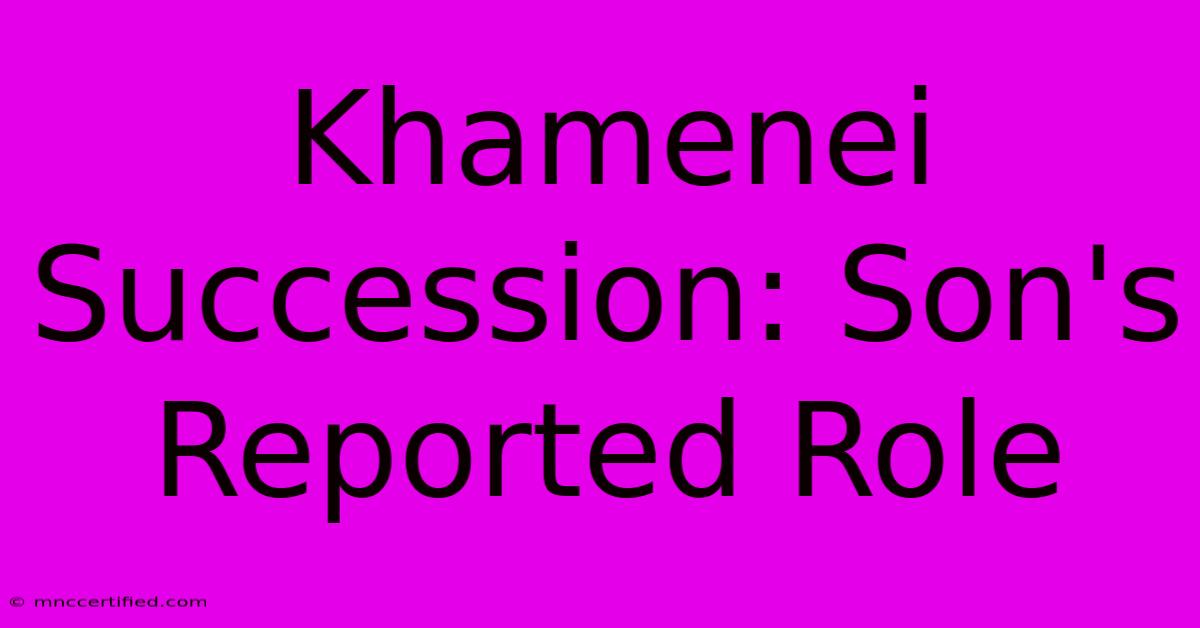Khamenei Succession: Son's Reported Role

Table of Contents
Khamenei Succession: Son's Reported Role – A Deep Dive into Iranian Politics
The question of succession for Iran's Supreme Leader, Ayatollah Ali Khamenei, has long been a subject of intense speculation and analysis. While the process remains shrouded in secrecy, recent reports focusing on the potential role of Khamenei's son, Mojtaba Khamenei, have intensified the debate. This article delves into the reported influence of Mojtaba Khamenei and explores the complexities surrounding the potential transfer of power in Iran.
Mojtaba Khamenei: A Rising Figure in the Shadows?
Mojtaba Khamenei, unlike his father, has avoided the public spotlight, remaining largely outside formal political structures. However, numerous reports paint a picture of a man wielding significant, albeit informal, power behind the scenes. His influence is reportedly felt across various factions and institutions within the Iranian establishment.
Reported Influence and Connections:
- Military and Security Apparatus: Sources suggest Mojtaba has close ties to key figures within Iran's powerful Islamic Revolutionary Guard Corps (IRGC) and other security organizations. This connection could be crucial in securing support for a future leadership bid.
- Clerical Circles: Despite lacking the traditional religious credentials of his father, Mojtaba is said to cultivate relationships with influential clerics, bolstering his claim to spiritual legitimacy.
- Economic Power: Reports suggest involvement in economic matters, potentially controlling significant financial resources and influence within the Iranian economy. This economic leverage could prove invaluable in navigating the intricacies of power succession.
It's crucial to note that much of this information comes from indirect sources and is difficult to independently verify. The opaque nature of the Iranian political system makes definitive conclusions challenging. However, the consistent recurrence of these claims across various reputable news sources and think tanks warrants serious consideration.
The Succession Process: A Complex and Uncertain Path
The process of selecting Iran's Supreme Leader is far from transparent. The Assembly of Experts, a body of 88 senior clerics, is responsible for electing the Supreme Leader. However, the Assembly's decisions are often influenced by powerful factions within the Iranian political landscape.
Potential Challenges and Obstacles:
- Internal Resistance: Mojtaba's reported lack of formal religious qualifications could face resistance from some hardline clerics who prioritize traditional hierarchical structures. A faction opposed to his ascension might actively campaign against his candidacy.
- Factional Disputes: The intricate web of political factions within Iran could create obstacles. Competition from other potential successors and the desire to maintain a balance of power could lead to significant infighting.
- International Pressure: The international community's reaction to Mojtaba's potential succession would likely be negative, given concerns about his reported influence and potential for a more hardline approach to foreign policy.
The Implications of Mojtaba Khamenei's Potential Role
The implications of Mojtaba Khamenei's potential succession are vast and far-reaching, affecting not only Iran's domestic politics but also its international relations.
Potential Scenarios:
- A More Hardline Approach: Some analysts suggest that Mojtaba's leadership could lead to a more hardline approach to domestic and foreign policy, potentially increasing tensions with the West.
- Continuity and Stability: Others argue that his succession might ensure continuity and stability, preventing significant internal upheaval during a critical transition.
- Increased Uncertainty: The very uncertainty surrounding the succession process itself poses a significant risk, potentially leading to increased instability within the country.
Conclusion: Monitoring the Shifting Sands of Iranian Politics
The question of Khamenei's succession remains one of the most important and unpredictable factors in contemporary Iranian politics. While Mojtaba Khamenei's purported influence is significant, the final outcome remains uncertain. Continued monitoring of the Iranian political scene is crucial for understanding the evolving power dynamics and assessing the potential ramifications for both Iran and the global community. The ongoing power struggles and the lack of transparency make accurate predictions challenging, but the reported role of Mojtaba Khamenei cannot be ignored in any serious discussion of the future leadership of Iran. Further research and analysis are crucial in navigating this complex and ever-changing landscape.

Thank you for visiting our website wich cover about Khamenei Succession: Son's Reported Role. We hope the information provided has been useful to you. Feel free to contact us if you have any questions or need further assistance. See you next time and dont miss to bookmark.
Featured Posts
-
Ingram Asks Sanders About Nfl Coaching
Nov 17, 2024
-
Is A Gas Station A Good Investment
Nov 17, 2024
-
Nebraska Football Loses At Usc
Nov 17, 2024
-
Charli Xcx On Snl 360 And Sympathy
Nov 17, 2024
-
Brolin Dinklage Unexpected Comedy
Nov 17, 2024